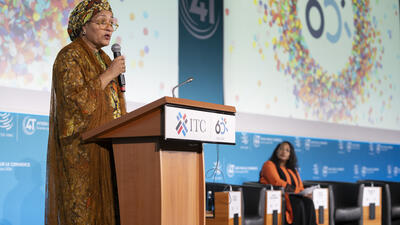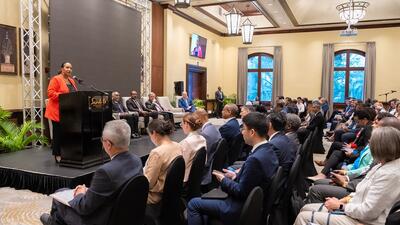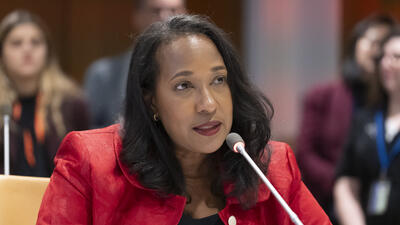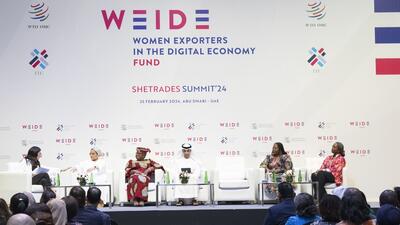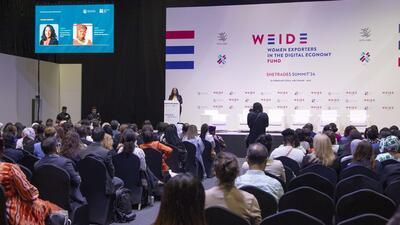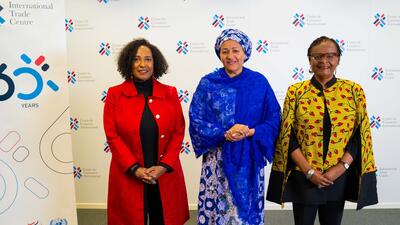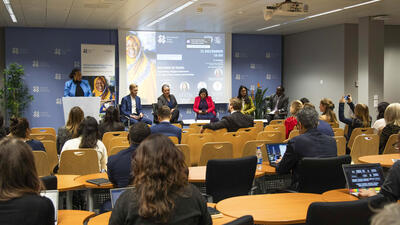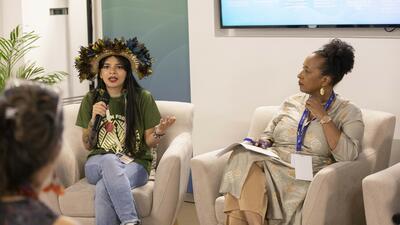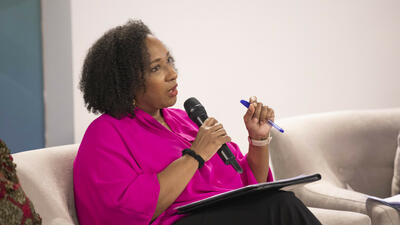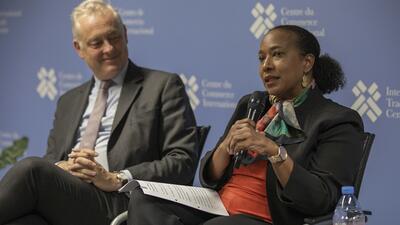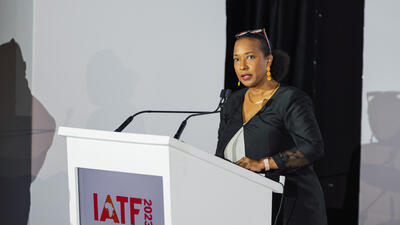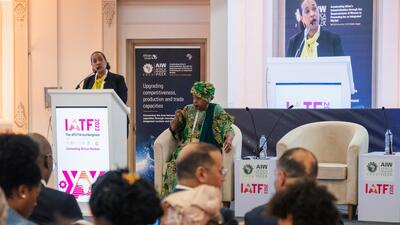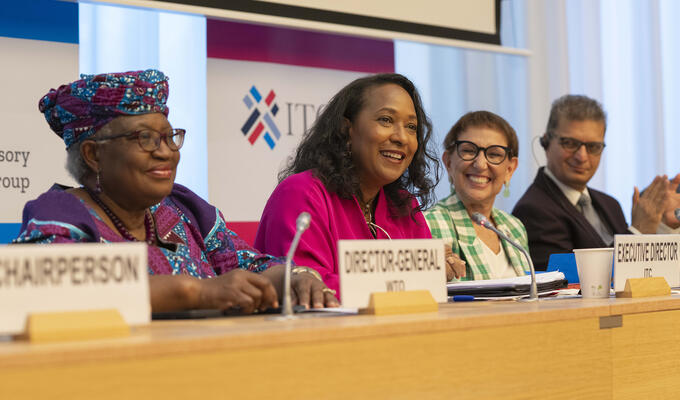
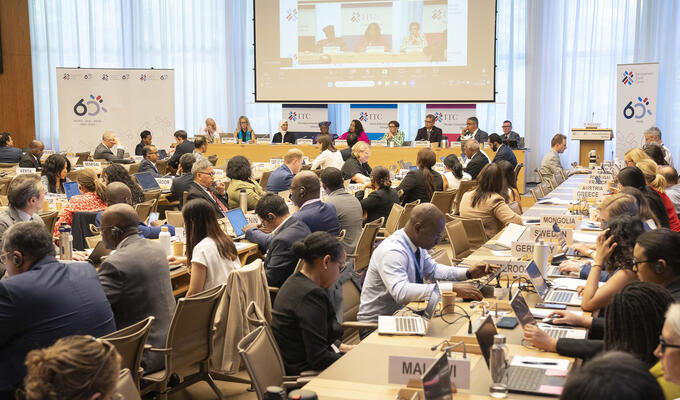
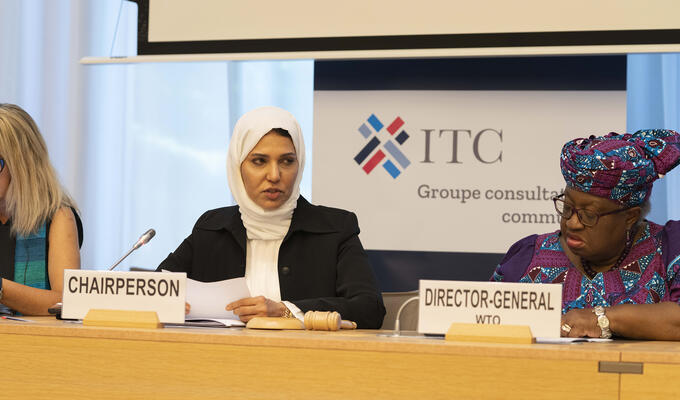
Trade looks good when we put people first
(Geneva, Switzerland) Executive Director Pamela Coke-Hamilton delivered her opening remarks at the 58th session of the Joint Advisory Group.
Director-General Ngozi Okonjo-Iweala,
Secretary-General Rebeca Grynspan,
And let me acknowledge, by the way, that this is actually the first time we’ve shared a stage since we each took on our current roles!
Ambassador Nadia Theodore,
Ambassador Hend Abdalrahman Al-Muftah,
Distinguished delegates, colleagues, and Friends of ITC,
Good morning and welcome to the fifty-eighth meeting of the Joint Advisory Group.
Before we begin, I would like to thank my dear friend, Ambassador Theodore, as the outgoing chair of our Joint Advisory Group.
Nadia, you are a stalwart advocate for the power of trade to change lives for the better, and you’ve taken the role of JAG Chair to new heights that will shape ITC’s future for a long time to come. Thank you for everything you’ve done for us.
I’d also like to congratulate you on Canada’s twelfth Trade Policy Review last week, which reaffirmed what we see every day: that Canada’s commitment to inclusive trade, serving both people and planet, is nothing short of world-class.
I’d now like to welcome Hend Abdalrahman Al-Muftah, Ambassador, Permanent Representative of Qatar to the United Nations Office at Geneva, as the incoming chair of our Joint Advisory Group.
Ambassador, we thank you for taking up the mantle of JAG chair, and I’m excited for what our collaboration will bring.
We’ve long been admirers of Qatar’s profound dedication to trade-led development, which we saw firsthand through your hosting of the LDC 5 Conference last year, and we’re honoured to have Qatar as a partner and close collaborator.
We know how much you value the role of small businesses in our trading system, and we’re honoured that you have agreed to undertake this responsibility for the coming year.
Now, as you all know, this is a big year for us at ITC, as we celebrate 60 years since we were formally established.
Sixty years is never a given for any institution. It’s a milestone that we’ve had to earn.
When we opened in May 1964, we only had four staff, sharing a venue with our colleagues from the GATT in Villa le Bocage.
Our ITC predecessors worked tirelessly to provide trade and market intelligence to exporters around the world, at a time without the internet, when even fax machines were a novelty.
And they did so well that they were given the resources, and the mandate, to keep growing and doing even more.
We could never have imagined where the road would take us.
We could never have imagined how much our understanding of trade would change.
We could never have imagined that we’d eventually have colleagues working all over the world, or that we’d have dedicated programmes on everything from gender to youth to digital to sustainability.
And yet, as we’ve been combing through our archives over these past several months, we can actually see when the seeds of these ideas were first planted.
As it turns out, more often than not, this kind of work was already happening at ITC long before the linkages between trade, sustainability, inclusion, and development were well-known, and fully recognized, the world over.
Walking alongside us throughout this journey, as champions, supporters, and dear friends, have been our two parent institutions, the WTO and UNCTAD.
Dr. Ngozi, Rebeca, thank you both for being here today, and for being so committed to ITC and to our collaboration.
Now, I know that 2024 is also one of major milestones for both of your institutions.
It’s the 30th anniversary since the Marrakesh Agreement was signed—a major success, and one that was hard-earned, as I remember all too well from my own days as a GATT negotiator from Jamaica during the final years of the Uruguay Round.
It’s also the 60th anniversary since the first session of the United Nations Conference on Trade and Development, and the establishment later that year of UNCTAD as a permanent intergovernmental body.
In your 60th anniversary year, you’ve taken this organization, where I’ve proudly worked, to the next level with your rebranding as UN Trade and Development.
These are big moments, well worth celebrating. Congratulations to you both and to your teams. You do your institutions great credit, and we’re proud to walk alongside you as part of the Geneva Trade Hub.
Our shared history is one of close collaboration, trust, and appreciation, and last year was no exception.
Our three institutions came together to put trade in the spotlight at last year’s UN Climate Change Conference—a forum where, too often, trade’s role in tackling the climate challenge has been misunderstood and overlooked.
We’ve also worked closely with our WTO colleagues to help developing countries as they determine how best to engage in new rule-making efforts, such as the Investment Facilitation for Development Agreement, or in showing what it means to apply a gender lens to existing rules and those under negotiation.
On that note, one of the biggest highlights of our recent work together was when we launched the Women Exporters in the Digital Economy Fund, or WEIDE, in Abu Dhabi this February, in front of a packed audience of women entrepreneurs, policymakers, and advocates.
The energy in the room when we announced this fund together was nothing short of electric, and we’ll be forever grateful to the government of the United Arab Emirates for that first $5 million contribution to our Fund. Let me take this opportunity to invite others here in this room today to come on board to this amazing new initiative.
We’ve shared an equally close relationship with UNCTAD, collaborating on everything from the implementation of trade facilitation portals to exploring what role the bioeconomy can play for greater environmental sustainability.
We’ve built a strong tradition of working together in providing trade and market intelligence and in helping assess countries’ e-trade readiness, and so much more.
Now, all of our institutions are having to grapple with an international landscape that is, to put it mildly, chaotic at best and devastating at worst.
I won’t mince words here: it isn’t going to get better anytime soon.
To pretend otherwise would be to ignore the painful realities that too many people are experiencing, whether they’re living through active conflicts, experiencing extreme hunger, or losing loved ones to the damage already being wrought by climate change.
And it’s at times like these where, too often, the urgent and immediate can take precedence over the systemic changes that are needed.
That’s what we need to avoid. And that’s what we’re committed to at ITC, in everything we do.
That’s why I’m proud to present ITC’s Annual Report for 2023. It’s a document that, as always, is both a stocktaking exercise on where we’ve been, along with a sneak preview of where we’re heading next.
And last year, it came at a moment when the world was taking stock of where we stand on achieving the SDGs, now at the midway point of the 2030 Agenda for Sustainable Development, and in meeting the objectives of the Paris Agreement on climate change.
The ITC Annual Report is an exercise that, despite the challenges we all face, gives us genuine hope for the future, while also showing us the work that lies ahead.
I can tell you, as I often do, about the big numbers.
That we signed over $159 million in new agreements for extrabudgetary funding last year alone.
That we were active in 144 countries.
That we had over 1.4 million registered users of our global public goods.
That we saw over 500 cases of improvements in business support organizations’ performance, or that we saw over $350 million in new business and investment transactions by the MSMEs we worked with.
These are numbers that we’re proud of, of course. But, as always, numbers are just one way to tell this story.
The other way to tell this story—perhaps an even better way to tell this story—is to talk about people.
Because that’s what trade is all about.
It’s a human story. It’s emotive. It’s aspirational. It’s transformational.
That’s why we include case studies in our Annual Reports now, which was not always common practice.
These case studies allow us to see what trade is like for the people we serve.
What obstacles they’ve overcome, what they’ve taught us, and how we’ve helped them achieve their goals.
Like the youth ecopreneurs that we celebrated last year in Mongolia at our World Export Development Forum, or WEDF, who won well-deserved recognition for their business solutions to major environmental challenges.
Like women working in the cashew value chain in Côte d’Ivoire and Sierra Leone, who are now receiving extension services that better suit their needs, and their hopes.
Like the digital freelancers we’ve been training in Ukraine, helping ensure that they can earn good livelihoods for themselves and their families despite the ongoing conflict.
Like the small businesses in Central Asia who are saving valuable time—and therefore cutting down on costs—because the Central Asia Gateway has brought together the national trade facilitation portals of five countries in one place.
We had the great honour of working with UNCTAD on that Gateway, and we are grateful for the recognition it received at the World Investment Forum, where it was awarded the “Best Trade Information Portal.”
Every single one of these success stories have one more thing in common: they were made possible through partnerships.
And we have many more partnership-driven initiatives on the way, all predicated on our firm belief that connected, sustainable, and inclusive trade is essential to the future we want.
I’ll give you one recent highlight from our partnerships strategy: last year, we signed an agreement with the Visa Foundation for refugee-focused programs in Pakistan and Kenya.
And earlier this year, we followed that by signing an agreement with the Mastercard Foundation on the creative economy in Uganda.
Partnerships work.
Partnerships bring in fresh energy and fresh perspectives from outside the UN bubble.
Partnerships challenge us with new geographies and help us reach new communities that we wouldn’t be able to otherwise.
Partnerships are what makes positive change happen—change that’s far greater than what any one of us could achieve alone.
We’ve seen that with our Global Trade Helpdesk, a platform that brings together not just our Geneva Trade Hub, but 11 partners who are all committed to the goal of making it easier for small businesses to get the right information they need to trade, and fast.
And it’s done so well that G20 trade and investment ministers last August issued the Jaipur Call for Action for enhancing MSMEs’ access to information, urging us to take this platform to new heights by incorporating the best and latest digital technologies.
This is what trade can look like when it’s connected, sustainable, and inclusive.
This is what trade can look like when we put people first.
That’s what you’ll see throughout the stories we’ve spotlighted in this year’s Annual Report, as you’ll hear in more detail today, including directly from these small business leaders themselves.
They’re stories that show how we’re shooting for the moon in the areas of green trade, gender, youth, and digital connectivity—and how we see a clear path ahead for landing all four of these moonshots.
But these stories also remind us of another truth, one that’s harder to swallow.
For all of our efforts, for many of these small businesses, the road ahead is going to get harder.
In a year where more voters than ever in history are heading to the polls, maintaining policies that support SMEs is becoming even more of a challenge.
That’s because fragility and conflict are becoming more common, not less.
That means that social services are often breaking down, and public goods are becoming harder for local governments to provide.
That means small businesses in these settings aren’t just trying to keep their businesses afloat, but in some cases are having to keep their own staff safe from harm as best they can.
And we’re seeing, daily, how natural disasters and changing weather patterns are destroying more than just our environment.
They’re also decimating crucial infrastructure and so many of the other resources that small businesses need to survive—not to mention extinguishing their years of hard work.
We’re seeing that multilateralism, underpinned by international cooperation, is facing some of the biggest challenges it’s seen yet, and the fall-out affects the very small businesses that we’re here to serve.
But, we can do something to change that, as long as we’re ready to act right now.
We’re finally living in a world where the role of small businesses is being talked about in policy forums at all levels, from municipal governments to international arenas.
Where the role of the private sector in crafting a future in line with the 2030 Agenda for Sustainable Development is not just a “nice to have,” but an essential precondition for success.
Where there are dedicated ministries and agencies within national governments that have small and medium-sized enterprises as their central focus.
And where the international community can come together in Antigua and Barbuda and agree on a SIDS Programme of Action that clearly recognizes the role of trade for achieving resilient prosperity.
Those are big wins in themselves. But we can’t rest on our laurels.
Small businesses are now looking to us to deliver on what we’ve promised.
And we need to live up to the faith they’ve placed in us.
I believe that we can, and that’s because of the people I see here, and because of the funders and partners who make our work possible.
I’d like to thank the governments here who made ITC’s projects throughout 2023 possible through extrabudgetary earmarked and non-earmarked support, including:
- Australia,
- Canada,
- Chile,
- China,
- Comoros,
- the European Union,
- Germany,
- Iceland
- India
- Ireland
- Japan,
- Mongolia,
- the Netherlands,
- Norway
- Republic of Korea,
- Sweden,
- Switzerland,
- the United Kingdom of Great Britain and Northern Ireland, and
- the United States of America.
On that note, I would like to make a special announcement.
As part of our own commitment to living up to the trust that small businesses place in ITC, we’re going to be hosting the first-ever global meeting solely dedicated to SME ministers next year.
I’ll be sharing more on what we have in store over the coming months, but for now, I can promise you this: it’s going to be an event to remember. An event focused on action, not just rhetoric. About results, not just potential. An event driven by what MSMEs want and need and how we can help them get there.
I’ve told you about the role we’ve played supporting MSMEs throughout 2023, and now I want to speak about the work we’re doing to support some of the biggest champions we have for trade-led development: our own ITC team.
They’re an impressive group of people, who hail from all corners of the world, and who every day are willing to go the distance to ensure trade can change lives and livelihoods for the better.
Last year, we put in place our Moving Forward Action Plan, which features a series of measures that we’re taking to tackle prohibited conduct at ITC effectively, and to ensure we have a workplace culture that we can all be proud of.
One that lives up to our values, and that lives up to the commitment that our ITC team shows us and our beneficiaries every day.
We’ve already made big strides, from giving financial support to our interns, to establishing new roles for formal and informal resolution of workplace issues, to making a sea change in staff-management dialogue and relations, to overhauling the systems we have for handling prohibited conduct so these live up to UN best practice and standards.
We have more to do, and I can assure you personally that we will never stop striving, every single day, to keep making ITC an even better place to work.
Now, I want to leave you with one last story, and that’s of a small business leader that I had the privilege to spend time with last month in Antigua and Barbuda during the SIDS4 Conference.
His name is Michael Louzé and he comes from Vanuatu. He’s a champion for kava, a local plant used in beverages and renowned for its unique taste.
Over a decade ago, Michael set up a company called South Seas Commodities following years of work in the kava sector.
He sources kava from local farmers and recognized early on what kava could mean for his country’s economy, while realizing that value addition was a critical component for success.
That’s why he installed solar and electric dryers that help farmers prepare what are known as noble kava roots, which they dry and process.
His company then washes and sanitizes these roots before export, ensuring a high-quality product that draws in greater revenues.
When Michael began his company, it was just an inkling of an idea, born out of the hope that introducing kava to new audiences would make a big difference for the communities he holds dear.
What he told me was this: that at a time when Vanuatu’s population was growing fast, its producers urgently needed to look for new markets that would give the local economy the boost it needed.
A boost that would help farmers pay school fees for their children.
A boost that would make it possible to share his country’s heritage and history with new audiences.
A boost that would empower Indigenous communities in Vanuatu that have long relied on subsistence farming, and who now make a high-quality good that is coveted by buyers in the United States and France.
We’ve been working with Michael and his team, together with the Pacific Community, so that more farmers can become part of this story.
This is why we do it. This is why we work so hard. This is why so many of us got into trade and development in the first place. Because of people like Michael.
That’s what I hope we can take away with us today.
Before I close, I want to remind you that this Thursday afternoon, here at the WTO in the CR room, we’ll be hosting our 60th anniversary celebrations from 4 PM onward.
Thank you so much, DG, for giving us a space during the Global Review, and SG, we look forward to your hosting the JAG as soon as the Palais renovations are done.
Now, I don’t want to spoil any surprises for Thursday’s anniversary celebrations, but I can promise you this: it’s going to be an unforgettable event, one that I hope will transform how we think about trade and its potential for good.
Thank you all.




